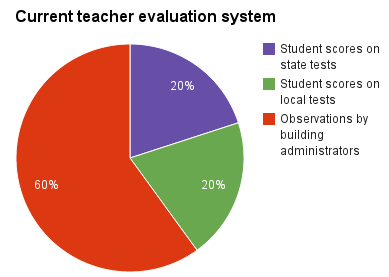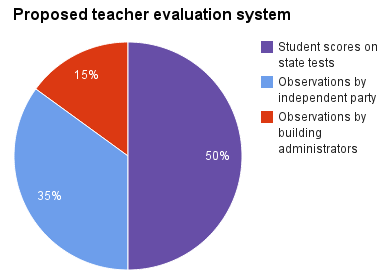The governor’s recently proposed changes to the teacher evaluation system, which include placing more weight on student test scores and bringing in an independent party for teacher observations, have incited anger and disbelief among local educators.
Governor Andrew Cuomo says the changes will establish an evaluation system that is “real, accurate and fair,” arguing that current student test scores do not reflect the “effective” and “very effective” ratings earned by the vast majority of teachers last year.
Less than one percent of teachers across the state were rated ineffective last year, for example, but only one-third of students in grades 3-8 scored at the proficient level and above in math and English language arts.
Riverhead’s numbers tell a similar tale: One hundred percent of Riverhead teachers were rated effective or highly effective during last year’s evaluations, while only 23 and 29 percent of students grades 3-8 scores at the proficient level and above in math and English assessments.
“We must ask ourselves, how can so many of our students be failing if our teachers are all succeeding?” Cuomo said in his budget message. “Who are we kidding here?” he asked.
But local teachers and administrators believe the teacher evaluation overhaul is too extensive and places too much significance on state testing.
“Rating teachers based on one test is crazy,” said Riverhead Central Faculty Association president Lisa Goulding, who is also a teacher at Riverhead High School. “It’s unfair to the kids. It puts too much pressure on students to perform well. Standardized tests are not the be-all of teaching.”
Currently, teachers are evaluated mostly through observations carried out by building principals and administrators. Sixty percent of their evaluations comes from these classroom observations, while the remaining 40 percent depends equally upon their students’ scores on state and local assessments.
Cuomo wants to eliminate student scores on local tests from the evaluation process altogether. Students’ scores on state assessments would now comprise 50 percent of the teacher’s evaluation — up from 20 percent under the current system. The other half of the evaluation would be determined by classroom observations — but mostly carried out by an independent party, rather than by the building administrator. In fact, observations done by the building administrator would account for only 15 percent of the teacher’s evaluation.


“Recent news reports found that most Long Island school districts have used their local discretion in teacher evaluation systems to skew the overall scoring to ensure that their teachers are rated only ‘effective’ and ‘highly effective,’” Jim Malatras, director of state operations, wrote in a letter to the acting commissioner of the State Education Department yesterday. “Most districts adopted the scoring procedures specifically drafted by the teachers’ unions,” he said, referring to an evaluation system devised by New York State United Teachers.
The evaluation rubric used in Riverhead is based on Charlotte Danielson’s Framework for Teaching, not the NYSUT rubric, Goulding said. Both, along with two others, were approved by the SED.
Local educators believe there is value in allowing teacher evaluations to be conducted by the teachers’ administrators.
“Principals and teachers get to know students and their families,” said Riverhead schools superintendent Nancy Carney. “Principals get to know teachers over time and work with them in developing goals based on ongoing observations and assessment,” she said.
“Having an independent observer who does not observe teaching and student work over time does not make sense,” Carney said.
“An outside evaluator doesn’t know my kids,” said Goulding. “They don’t know my school or my district. On the flip side, the principal knows the teacher.” They know when a teacher isn’t the “right fit” for the building — even if the teacher is rated “highly effective.”
Both Carney and Goulding also believed that the added importance placed on state assessments is inappropriate.
“Basing student proficiency or teacher effectiveness on one state assessment per year for any students or teachers is unreliable,” Carney said.
She took particularly issue with the state’s “one-size fits all approach,” which requires that all students must take the same state assessments, even special education and English language learner students.
“Giving all students the same assessment, regardless of their proficiency in the English language or on their developmental level, yields a false picture of student achievement,” she said. “This becomes so clear when looking at student work in special education or a bi-lingual classroom over the course of a year.”
Cuomo’s proposal also includes changes to state procedures for awarding tenure to teachers. Tenure is currently awarded to teachers after three years, but under the proposed changes, tenure would only be awarded after five consecutive annual ratings of effective or highly effective, based on the new teacher evaluation guidelines.
“The origins of tenure and its use at the university level are not aligned with its current role or implementation in our K-12 system,” Cuomo said.
Goulding, however, argued that tenure is a necessary for teachers to do their jobs effectively.
“Tenure allows me to go to my principal and say, ‘You’re wrong,’” she said.
According to Cuomo’s proposal, teachers who fail to meet the new requirements for tenure may be dismissed “at any time for any reason, performance or otherwise.”
“Good teachers deserve to be treated as professionals,” Carney said. “They deserve to be respected.”
Denise Civiletti contributed reporting.
The survival of local journalism depends on your support.
We are a small family-owned operation. You rely on us to stay informed, and we depend on you to make our work possible. Just a few dollars can help us continue to bring this important service to our community.
Support RiverheadLOCAL today.






























